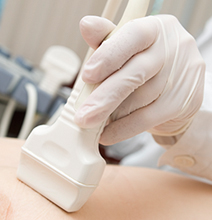Cytology or biopsy
Is it benign or malignant? How aggressive it is?
As recently as 15 years ago a tumor could only be studied during or after surgery, once a sample has been removed and analyzed. This meant that every single woman with breast changes would be operated and without knowing if their tumor was malignant or benign, so too often unnecessarily.
Current procedures, where a sample of the tumor is removed by a small puncture in the breast, have revolutionized breast cancer treatments:
- Doctors operate knowing that the tumor is cancerous;
- This means they can decide, pre-operation, on different options of treatment depending on the type of cancer - for example, whether to do a mastectomy or a more conservative surgery
- They also can discuss and decide the options together with the patient before surgery
Biopsies (or cytology) allow the woman to find out if she has cancer before being operated on
• Biopsy – procedure where a tissue sample is removed and analyzed under the microscope to make a diagnosis
• Cytology – similar to a biopsy, except that what is removed and examined is a cell (or a few cells). Used, for example, to test fluids from inside the tumors.
Collecting samples from a tumor:
A breast puncture to collect samples can be done by fine-needle aspiration (FNA) (also called fine-needle aspiration cytology FNAC)
or by core (thick) needle biopsy (CNB).
.
In most cases, the samples come from a nodule, but they can also be breast skin (for example in the case of inflammatory breast cancer





